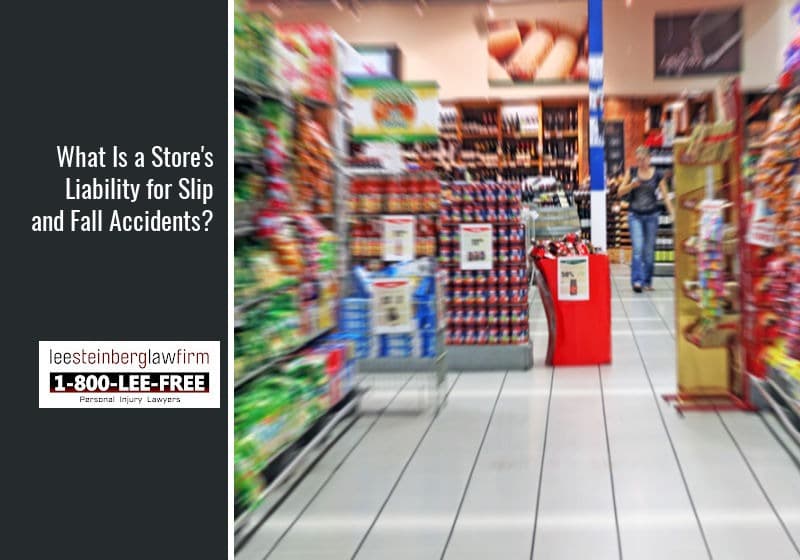
Key Points of This Article:
- Slip and fall accidents are common and can lead to serious injuries that require hospitalization.
- Stores can be held liable for a slip and fall accident.
- Holding a store liable and proving they were negligent can be challenging and requires the help of an attorney.
Most people don’t tend to think about slip and fall accidents and how to handle them, but slip and falls are actually quite common, especially while out shopping. In fact, over one million visits to the hospital every year are due to slip and fall accidents. And floors, or flooring materials, such as those used in retail establishments and grocery stores, contribute to more than two million falls annually.
But what happens when you slip and fall in a store and get injured? Who is liable for the fall and responsible for compensating you for your injuries? What is a store’s liability for slip and fall accidents?
In Michigan, stores can be held liable for a slip and fall, but it depends on the circumstances.
If you have further questions after reading this article and need help filing a slip and fall liability claim, the Detroit and Michigan slip and fall lawyers at The Lee Steinberg Law firm can assist you.
What Is Considered a Slip and Fall Accident, and How Do They Occur in Stores?
In the simplest of terms, a slip and fall accident happens when someone slips, trips, or stumbles due to a hazardous condition and then falls as a result. But a slip and fall can happen in any number of ways, and thus the term “slip and fall” covers a wide variety of situations.
In a store, a slip and fall accident can happen for any of the following reasons:
- Wet floors from rain, snow, or ice being tracked in
- Floors that are slippery after being mopped or waxed
- Something being spilled on a floor, such as a drink or other kinds of liquids from broken items or products leaking in the store
- Products falling onto the floor and blocking a clear path
- Cluttered aisles
- Obstructive product displays
- Wet bathrooms
- Poor lighting
- Lack of handrails on ramps or steps
- Uneven or broken flooring
- Unsecure rugs
- Loose cords
Can a Store Be Held Responsible for a Slip and Fall Accident in Michigan?
A store can be held liable for a slip and fall accident in Michigan, but it will depend on some specifics concerning how the accident happened. For example, if someone entered a store and knowingly put themselves into a dangerous situation that could have been avoided, it is unlikely that they will be able to hold the store responsible. But if the store failed to take care of a hazard that could have prevented the accident from happening in the first place, then they could be held liable.
Let’s take a closer look at Michigan’s slip and fall liability laws to better understand how this works.
Michigan’s Slip and Fall Premises Liability Laws
Slip and Fall Liability
A store’s liability for slip and fall accidents is based on something called premises liability. In Michigan, property owners—such as store owners or the store company— have a responsibility to ensure that their premises are safe and free of hazards to protect their visitors from harm. However, the store must have been aware of the hazard or must have had reasonable time to know about the hazard and take care of it and then failed to do so for them to be held liable.
So, for a store to be held responsible, the following criteria must be met:
- The store owner owed the visitor a duty of care.
- The store/property contained a hazardous condition.
- The store/owner knew or should have known about the hazardous condition.
- The store/owner breached their duty of care by failing to take care of the hazardous condition in a reasonable amount of time.
- The store’s breach of duty was the proximate cause of the slip and fall accident.
- The victim suffered injuries as a result of the store’s breach of duty.
Open and Obvious Doctrine:
It’s important to note that while stores and property owners have a responsibility to provide a reasonably safe premise free of known hazards, it is also the visitor’s responsibility to avoid hazards that are readily apparent according to the open and obvious doctrine.
In other words, if there is an obvious hazard or danger that can be avoided, the customer should take care to avoid it. If they don’t and knowingly put themselves at risk, they will likely be unable to hold the store accountable if they get injured as a result.
The Lee Steinberg Law Firm: Helping Victims of Slip and Fall Accidents in Detroit and Michigan
If you are injured in a slip and fall accident in Michigan, make sure you seek immediate medical attention if needed and contact an attorney as soon as possible. Slip and fall accidents can be tricky because it is not always easy to prove that the store or property owner knew about the hazard before the fall occurred.
However, our team of slip and fall lawyers have years of experience handling these kinds of cases and know what it takes to hold the store responsible to ensure you get the compensation you deserve.
Call our law firm at 1-800-LEE-FREE (1-800-533-3733) to speak with an experienced slip and fall attorney. Our consultations are free and confidential, and you’ll pay nothing until we settle your slip and fall case.
